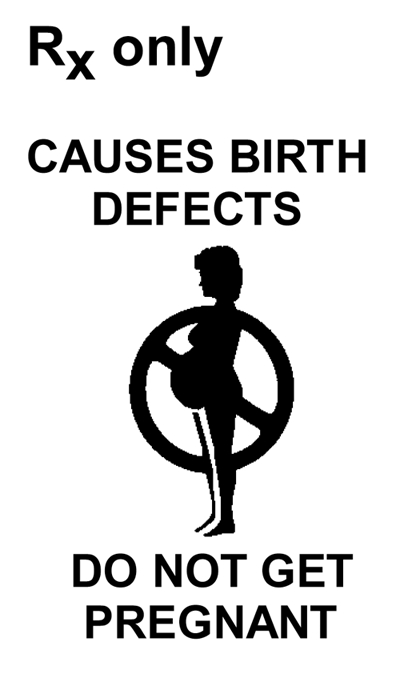The United States has ramped up efforts to mitigate the risk of birth defects associated with isotretinoin (Accutane) by requiring physicians and patients to register before they can prescribe or take the drug. The response in Canada has been markedly less stringent, despite recommendations last year from a federal government expert advisory committee.
Isotretinoin, used to treat recalcitrant nodular acne, is known to have serious side effects, including birth defects, severe depression and, potentially, vascular incidents.
On Mar. 1, the US Food and Drug Administration (FDA) made iPLEDGE, its risk management program aimed at preventing use of the drug during pregnancy, compulsory (www.ipledgeprogam.com). To obtain the drug, patients must register with iPLEDGE, complete an informed consent form and obtain counseling about the risks. Women of childbearing age must take 2 pregnancy tests and be on 2 forms of birth control or abstain from sex. Physicians must also register with iPLEDGE prior to prescribing isotretinoin.
The FDA made the changes following recommendations from 2 of its advisory committee in 2000 and again in 2004. “Fetal exposures continued to occur, and the risk [of pregnancy] had not been adequately mitigated,” says Dr. Jill Lindstrom, acting deputy director, Division of Dermatologic and Dental Products Centre for Drug Evaluation and Research of the FDA.
Between 1982, when the drug first came on the US market, and 2000, its manufacturer Roche Pharmaceuticals reported 1995 pregnancy exposures and 383 live births. Of those births, 162 infants had birth defects. Between 2001 and 2003, there were 325 known pregnancy exposures. The FDA estimates that 100 000 prescriptions are written for the drug each month in the US.
In Canada, an estimated 224 600 prescriptions for isotretinoin were filled in the past year, according to IMS Health (retail value of $32 million). The manufacturer reports an average of 3.6 pregnancy exposures per year between 1996 and 2003. Between January 1983 and December 2004, Health Canada identified only 3 “fetal disorders” as “possibly due to Accutane exposure.”
Health Canada recently stated that although FDA information suggests a “signficant rate” of pregnancy exposures “Health Canada's pharmacovigilance program... has shown no evidence of a comparable situation in Canada.” (CMAJ 2005;172:15).
However, the Motherisk Program at the Toronto Hospital for Sick Children receives an average of 10 to 20 pregnancy exposure reports annually.
Not all cases are reported, says Motherisk Director Dr. Gideon Koren, because Health Canada doesn't have a comprehensive monitoring system. Health Canada discontinued the development of Mothernet, which would have captured such cases, several years ago.
“Unfortunately pregnant women are not a priority for Health Canada,” says Koren.
Health Canada requires that women taking isotretinoin give written informed consent, receive education about the teratogenicity of the drug, and agree to use 2 contraceptive methods while on the drug. Similar measures in the US were ruled by the FDA to be insufficient to protect fetuses.
Rather than an iPLEDGE-type registry, Motherisk suggests a mandatory Web-based training program and certification of physicians as a condition for prescribing isotretinoin. A similar program exists for methadone.
In May 2005, Health Canada's Scientific Advisory Panel on isotretinoin unanimously rejecting the idea of an i-PLEDGE type registry for Canada, but otherwise its recommendations were strikingly similar to those measures being taken in the US, including introducing an expanded physicians' checklist, a consent form, a toll-free information number, a Web site, an education program for family doctors and pharmacists, and pregnancy testing.
Dr. Jack Toole, chair of the panel says “There is absolutely no question that pregnancy exposure on isotretinoin must be prevented and that we must do all that we possibly can to do that.”
The panel's recommendations have not been acted on. Health Canada spokesperson, Christopher Williams, says the government expects to convene a working group by September to “analyze the best way of putting them into effect. However, it is unlikely that any implementation will take place in 2006.”
In April, Health Canada released another advisory about the drug, asking doctors to report any cases of myocardial infarction, cerebrovascular and thromboembolic disorders suspected of being associated with isotretinoin (CMAJ 2006;174:1211). Since 1983 there have been 29 reported incidents of vascular disorders. Williams said that “no causal link between this type of side effect and the drug has been established.”
The drug ranks in the top 10 of the US FDA's database of drugs associated with reports of depression and suicide attempts. In Canada, 25% of adverse responses reported since isotretinoin was introduced relate to psychiatric events. A warning of the possible link was issued in 2001.
Although it is intended as a drug of last resort for extreme cases of acne, isotretinoin is increasingly being used for milder cases, as well as for psoriasis rosacea and other conditions. — Margot Andresen, Gatineau, Quebec

Figure. This image appears on the Roche Pharmaceuticals patient information for Accutane. Photo by: Roche Pharmaceuticals
Footnotes
Published at www.cmaj.ca on May 17, 2006.


